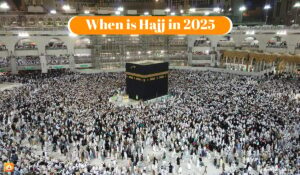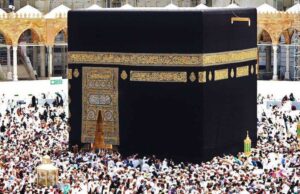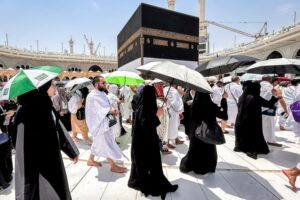Hajj –
Our next story is from Saudi Arabia, where a Hajj pilgrimage has begun. This is an annual pilgrimage made by Muslims to the holy city of Mecca, and it is one of Islam’s core practices. Every able-bodied Muslim who can afford it is expected to undertake this journey at least once in their life. So the Hajj is one of the largest gatherings of people in the world. Millions of people make the journey every year, but it is physically demanding. And amid rising temperatures, it has become an endurance test, not just for the pilgrims, but also for the government of Saudi Arabia.

Temperatures – Last year, temperatures crossed 50 degrees Celsius, and more than 1,300 pilgrims died due to heat stress. This year, it is expected to be just as hot. It is a logistical challenge for the Kingdom. So what are they doing to make it safer this time? Here’s a report.
Pilgrimage – The Hajj pilgrimage has begun. This is an annual pilgrimage made by Muslims to the holy city of Mecca in Saudi Arabia.
Every able-bodied Muslim can afford it. Every able-bodied Muslim, who can afford it, is expected to undertake the journey at least once. So every year, millions of Muslims from across the world make the journey. The Hajj is one of the largest human gatherings in the world. But amid rising seasons and growing logistical challenges, the pilgrimage is shaping up to be different this year.
Overcrowding – The Hajj has seen several catastrophes over the years. In 2015, there was a stampede. More than 2,200 people died. But overcrowding is just part of the problem. The Hajj has always been physically demanding. Pilgrims often walk more than 16 kilometers each day under the desert sun. So even in a typical year, several older and ailing pilgrims die during the arduous journey.
Heat – Despite rising temperatures, the situation has only worsened. Last year, Mecca recorded temperatures as high as 51.8 degrees Celsius during the pilgrimage, and more than 1,300 pilgrims died. Most of them were unregistered pilgrims. They had made the trip without the permits to be a part of the pilgrimage.
Permit – People need a Hajj permit. It also gives pilgrims access to heat protections, like air-conditioned tents and official cooling centers. In many countries, the wait for a permit stretches for years, and for many families from lower-income backgrounds. Cost is too high, often exceeding $10,000. So Hajj is out of reach for many. This has led to people increasingly attempting the pilgrimage, without the official permit.
Organizers – Sean McLoughlin (Professor, University of Leeds)
“We know that some pilgrims are promised entry for Hajj by unscrupulous Hajj organizers. This could happen around the world, but if pilgrims are taken for Hajj but don’t have access to services, then they could find themselves in particular difficulty.”
Crackdown – That’s not all. Saudi Arabia is cracking down harder on unregistered pilgrims. As of Sunday, officials have stopped about 270,000 people. Studies say that this year, temperatures could again exceed 50 degrees Celsius during the pilgrimage. This week, about 1.5 million pilgrims from abroad have arrived in Mecca.
Safety – So the government has taken efforts to make the pilgrimage safer, like expanding rubberized and cooled roads to reduce surface temperatures, adding more air-conditioned rest stops, misting stations and water supply points, using drones to monitor pilgrims’ movements, giving pilgrims wearable devices to monitor body temperature, and send alerts if there are signs of heat exhaustion.
 Infrastructure – The stakes are high for Saudi Arabia. They consider themselves the guardian of Islam’s holiest site. They have benefited from the Hajj tourism economy for years, and they want to double Hajj numbers to around 6 million by 2030. So over the years, the government has poured billions of dollars into developing Mecca infrastructure, from multi-level pathways to sophisticated crowd control mechanisms.
Infrastructure – The stakes are high for Saudi Arabia. They consider themselves the guardian of Islam’s holiest site. They have benefited from the Hajj tourism economy for years, and they want to double Hajj numbers to around 6 million by 2030. So over the years, the government has poured billions of dollars into developing Mecca infrastructure, from multi-level pathways to sophisticated crowd control mechanisms.
Endurance – But with the warming summer, the Hajj pilgrimage has become an endurance test, not just for the pilgrims, but also for Saudi Arabia.
